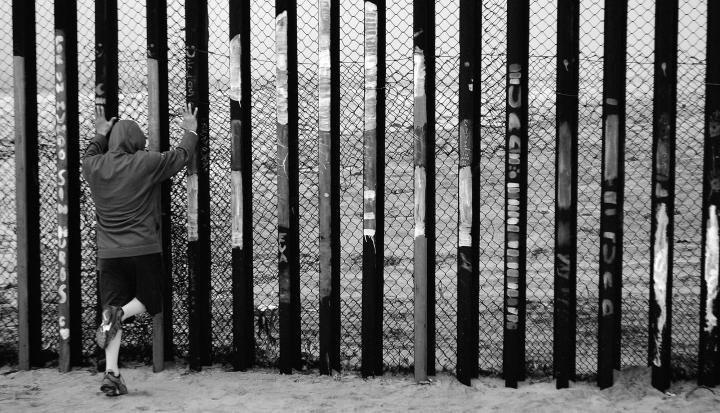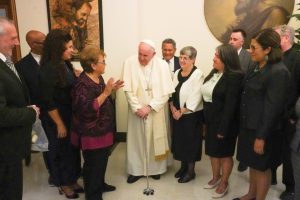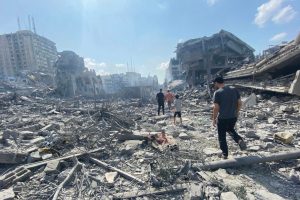Claretian Father Carl Quebedeaux has worked in Juárez, Mexico for the past four years. The parish he serves, Parroquia Nuestra Señora de la Esperanza, or Our Lady of Hope, is located near the fence on the U.S.-Mexico border.
Quebedeaux’s ministry has given him a front-row seat to immigration, both to the United States and within Mexico. “Juárez is a city of migrants,” he says. “Over the years, many have come from other areas of Mexico seeking employment in the over 400 maquila factories located here. In the past, most came from areas in the very south of Mexico—places like Veracruz, Oaxaca, Chiapas, Durango, Zacatecas, and Coahuila.”
He says this changed, however, in October 2018, when large caravans of migrants from Central America and other countries—especially Cuba—began to arrive in Juárez hoping to cross the border into the United States. Prevented by President Trump’s immigration ban, these new migrants, most of whom were not from Mexico, quickly overwhelmed the city of 1.3 million.
Quebedeaux’s parish and the Diocese of Ciudad Juárez jumped in to try to meet the growing needs of these people, who are now trapped at the border with nowhere to go. U.S. Catholic sat down with Quebedeaux to ask him what most U.S. Catholics don’t understand about the immigration crisis and how we can help.
What is the biggest challenge facing migrants in Juárez?
These people face a variety of challenges. All have sacrificed greatly in leaving their countries. They are all seeking asylum and fleeing situations where their lives have been threatened. Many have lost loved ones or have been subject to threats, assaults, extortion, and other hardships.
They reach the U.S.-Mexico border seeking asylum in the United States, and current immigration protocol says that they must wait in Mexico while going through the asylum process. So then they have to search for a safe place to live in Juárez, a city known for its violence.
There are also currently about 3,000 refugees from other parts of Mexico who have been unable to find housing. These people are living in camps under bridges around Juárez. They are exposed to the cold and rain and are very vulnerable.
The government, nonprofit organizations, and the Catholic Church are trying to help. Several shelters have opened, and some migrants have been able to find rental housing in the city. The Mexican federal government has opened a large facility called Leona Vicario that currently houses over 600 migrants. But despite this, safe housing remains a struggle, and many migrants return to their country of origin, despite the dangers they face by going back.
Those who remain must find English-speaking lawyers who can help them with the documentation process necessary to gain asylum. They must attend four different appointments with U.S. immigration officials. At the end of this difficult process, very few are accepted. They must then decide whether to return to their countries—where their lives are often threatened—or settle in Mexico, like in Juárez, a difficult and violent city.
How do people keep going in the face of these challenges?
Most people have support from their families: Many have relatives in the United States who try to help or relatives back home they keep in touch with.
It can take years to schedule all the necessary appointments and interviews with U.S. immigration officials. Many people are able to find jobs and rent housing in Juárez while they are waiting. For example, more than 70 percent of the over 3,000 migrants in Juárez right now are from Cuba, and many of these people rent housing and some have opened small businesses.
A variety of groups provide people with English-language legal assistance and help them prepare for the interviews. These include CLINIC (Catholic Legal Immigration Network, Inc.), a Catholic group that sponsors lawyers, and HIAS (Hebrew Immigrant Aid Society), a group of Jewish lawyers.
How has your parish worked to meet the changing needs of migrants in the four years since you moved to Juarez?
We have tried to follow Pope Francis’ call to accompany and protect migrants and help them integrate into our lives. Our local parishioners have been remarkable in their response to receive and accompany migrants.
The Diocese of Ciudad Juárez sponsors a shelter called Casa del Migrante that supports migrants in Juárez. The shelter was started in the 1980s and was administered by first the Scalabrinian Missionaries and later the Dominicans before being taken over by the diocese. Traditionally, it receives migrants with food and shelter, provides counseling, and assists people deported from the United States.
Five parishes here in Juárez, including my own, send volunteers to Casa del Migrante every week. We’ve done this since November 2018. We help with meal preparation and provide medical care and activities for the children. Since we’ve began, I’ve seen a huge increase in the number of migrants at Casa del Migrante. Now there are often 600 or more people staying at the shelter at a time.
This is because in January 2019 the Trump administration decided that migrants must wait for asylum in Mexico. Suddenly there were over 30,000 migrants waiting for admission into the United States at the border. Casa del Migrante and other shelters quickly became saturated, and these people had nowhere to go.
The bishop called on other Catholic churches and organizations to help, and we opened our own small shelter, Casa Oscar Romero. We currently house approximately 30 migrants who are waiting for their entrance interviews, including 14 children. These people come principally from El Salvador, Guatemala, and Honduras. All are fleeing violence.
We’ve helped most of these people find work in the maquila factories, and we’ve been able to find schools for the children. In 2019 we sponsored a summer camp for migrant children that provided them with three to four hours of daily recreational activities.
In September 2019 a large number of internal migrants arrived in Juárez. These people were fleeing violence in Mexican states such as Michoacán and Guerrero, and, because the shelters were already full with migrants from other Central American nations, over 3,000 are now camped at different bridges in Juárez. My parish tries to serve these refugees by celebrating Mass with them on a regular basis.
What do you wish U.S. Catholics knew about the migrant crisis in Mexico?
Migrants are noble, generous, faithful, and hardworking people seeking asylum. They are fleeing situations of violence, extortion, torture, and threats against them and their families.
But despite being traumatized, they are faith-filled, hopeful, and dedicated. They are young, children, infants, men, and women. They are families: a father with his son or daughter and widows with children.
Many have relatives in the United States: uncles, cousins, brothers, and sisters living and working there. This gives them hope of a better life for themselves and their families in a safer country.
How do you hope the situation of people immigrating to the United States changes?
I hope the future will see a greater respect for human rights. The ability to seek asylum is a basic human right. I would hope that right would be respected and that the United States would give priority to those seeking asylum.
Today, however, U.S. policies do not support people seeking asylum, and the law is very strictly applied. Most requests are refused, and asylum seekers must go through the process in Mexico, which makes it more difficult.
A more humane policy, and one that has been in place in the past, is one where asylum seekers are allowed into the United States and allowed to apply for asylum while living in safety and accompanied by their families. But today all of that has changed.
How can people of faith in the United States support these migrants?
American Catholics can support humane immigration reform in the United States where migrants and asylum seekers are given due process. They can donate their money or time to local, national, or international efforts toward humanitarian assistance for migrants. They can also pray for migrants and refugees in their struggles here at the border as they await their appointments.
Image: Max Böhme on Unsplash














Add comment